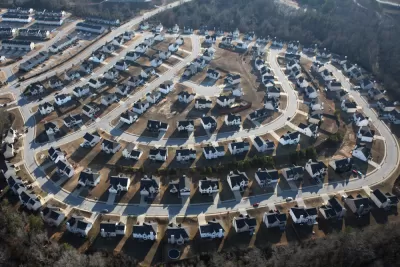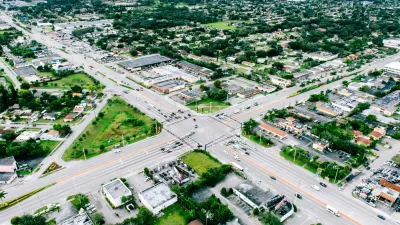For many decades now, most communities in the United States have grown as a series of subdivisions, built on a tried and true formula. It might be time to change the math.

"[Z]oning disputes typically only involve a few parcels of land at a time," according to Sarah Kobos. Controversial and headline-grabbing as some zoning disputes might be, "if you really care about the future of your city, you need to think bigger." One place to look to find the kind of scale Kobos seeks: subdivision regulations.
Kobos writes the local subdivision regulations wield tremendous power, but from obscurity. "Even the most battle-hardened veteran of the zoning wars would be hard pressed to explain what the subdivision regulations do."
That's where Kobos's article comes in: to explain the ins and outs of subdivision regulations, and why they matter to the experience and livability of communities. "If your city hasn’t re-evaluated its subdivision regulations in a while, you’re probably still replicating bad ideas from the 1970’s — creating inflexible, and auto-centric places," writes Kobos. As prescription for subdivision malaise, Kobos recommends a few "baby step" changes that can help implement incremental change with regard to block lengths, connectivity, and cul-de-sacs.
FULL STORY: You Care About the Subdivision Regulations, You Just Don't Know it (Yet)

Maui's Vacation Rental Debate Turns Ugly
Verbal attacks, misinformation campaigns and fistfights plague a high-stakes debate to convert thousands of vacation rentals into long-term housing.

Planetizen Federal Action Tracker
A weekly monitor of how Trump’s orders and actions are impacting planners and planning in America.

In Urban Planning, AI Prompting Could be the New Design Thinking
Creativity has long been key to great urban design. What if we see AI as our new creative partner?

King County Supportive Housing Program Offers Hope for Unhoused Residents
The county is taking a ‘Housing First’ approach that prioritizes getting people into housing, then offering wraparound supportive services.

Researchers Use AI to Get Clearer Picture of US Housing
Analysts are using artificial intelligence to supercharge their research by allowing them to comb through data faster. Though these AI tools can be error prone, they save time and housing researchers are optimistic about the future.

Making Shared Micromobility More Inclusive
Cities and shared mobility system operators can do more to include people with disabilities in planning and operations, per a new report.
Urban Design for Planners 1: Software Tools
This six-course series explores essential urban design concepts using open source software and equips planners with the tools they need to participate fully in the urban design process.
Planning for Universal Design
Learn the tools for implementing Universal Design in planning regulations.
planning NEXT
Appalachian Highlands Housing Partners
Gallatin County Department of Planning & Community Development
Mpact (founded as Rail~Volution)
City of Camden Redevelopment Agency
City of Astoria
City of Portland
City of Laramie





























